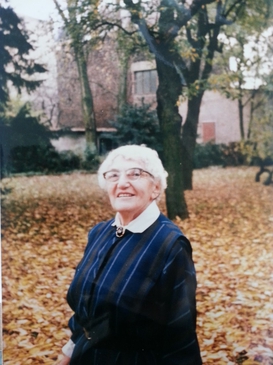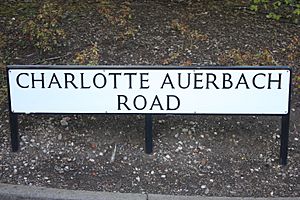Charlotte Auerbach facts for kids
Quick facts for kids
Charlotte Auerbach
FRS FRSE
|
|
|---|---|

Lotte Auerbach circa 1955.
|
|
| Born | 14 May 1899 |
| Died | 17 April 1994 (aged 94) Edinburgh
|
| Nationality | German |
| Citizenship | Germany, United Kingdom |
| Known for | mutagenesis |
| Awards | Darwin Medal 1976 |
| Scientific career | |
| Fields | genetics |
Charlotte "Lotte" Auerbach was a German geneticist who helped create the science of mutagenesis. This is the study of how changes happen in the genes of living things.
She became famous after 1942. She discovered that mustard gas could cause changes, or mutations, in fruit flies. She worked with A. J. Clark and J. M. Robson on this discovery.
Charlotte Auerbach wrote 91 scientific papers. She was also a member of the Royal Society of Edinburgh and the Royal Society of London. In 1976, she received the Darwin Medal for her important work.
People admired her for her wide interests and honest personality. She was also very independent and modest.
Contents
Early Life and Studies
Charlotte Auerbach was born in Krefeld, Germany, on May 14, 1899. Her parents were Selma Sachs and Friedrich Auerbach. Science ran in her family. Her father, Friedrich Auerbach, was a chemist. Her uncle was a physicist, and her grandfather, Leopold Auerbach, studied anatomy.
She studied biology and chemistry at universities in Würzburg, Freiburg, and Berlin. She learned from inspiring teachers like Karl Michael Haider and Max Hartmann.
After finishing her studies, she decided to become a science teacher. She passed her teaching exams with high marks in 1924.
She taught in Heidelberg and at the University of Frankfurt. She was likely fired from Frankfurt because she was Jewish.
In 1928, she started research at the Kaiser Wilhelm Institute for Biology. She worked on how living things develop. However, she left this work in 1929. Her boss, Otto Mangold, was very strict.
She taught biology again in Berlin schools. But the Nazi party made laws against Jewish people. This meant she could no longer teach. In 1933, she followed her mother's advice and moved to Edinburgh. There, she earned her PhD in 1935 at the University of Edinburgh. She stayed connected to this university for her entire career.
Research in Edinburgh
Charlotte Auerbach's PhD research was about how legs develop in Drosophila (fruit flies). After her PhD, she became an assistant to Francis Albert Eley Crew. He introduced her to many scientists, including Hermann Joseph Muller. Muller was a famous geneticist who studied mutations. He stayed in Edinburgh from 1938 to 1940. He taught Charlotte about mutation research.
At first, Charlotte didn't want to work with Muller. But Muller convinced her that understanding mutations was key to understanding how genes work. She later said his excitement for mutation research was "infectious." She switched to studying mutations and never regretted it.
Her important research on genetic mutations using mustard gas was kept secret for many years. This was because the government considered it classified. She was finally able to publish her findings in 1947.
After being an assistant, Auerbach became a lecturer in 1947. She became a Professor of Genetics in 1967. She retired as a Professor Emeritus in 1969.
Teaching and Books
Charlotte Auerbach enjoyed teaching at the university. Her lectures were very clear and easy to understand. She spoke with confidence and welcomed questions from her students.
She wrote several books to help people learn about genetics. Some of her books were translated into other languages. Her book, Genetics in the Atomic Age (1956), was highly praised. It explained complex scientific ideas in a simple way.
Other Interests
Charlotte Auerbach supported the Campaign for Nuclear Disarmament (CND). She was also strongly against apartheid, a system of unfair treatment in South Africa. She was known for her liberal views.
In 1947, she wrote a book of fairy stories called Adventures with Rosalind. She used the pen-name Charlotte Austen for this book.
Personal Life
Charlotte was an only child. Her Jewish family had lived in Breslau for many generations. She became a British citizen in 1939 after fleeing Nazi Germany in 1933.
Charlotte Auerbach never married and did not have her own children. However, she unofficially "adopted" two boys. One boy, Michael Avern, was the child of a companion to her elderly mother. She helped raise Michael. The other boy, Angelo Alecci, came from a poor family in Sicily. Charlotte connected with him through the Save the Children Fund.
Later Life
In 1989, when she was 90 years old, she gave her house in Edinburgh to Michael Avern. She then moved into a care home in Edinburgh. She passed away there five years later, in 1994.
Awards and Honors
Charlotte Auerbach received many awards and honors for her scientific work:
- Keith Prize, Royal Society of Edinburgh (1947)
- Fellow of Royal Society of Edinburgh (1949)
- Fellow of the Royal Society (1957)
- Foreign Member, Danish Academy of Science (1968)
- Foreign Member, National Academy of Sciences (1970)
- Honorary degrees from several universities, including Leiden University (1975) and University of Cambridge (1976).
- Darwin Medal, Royal Society (1976)
- Fellow, United Kingdom Environmental Mutagen Society (1978)
- Prix de d'Institut de la Vie (1982)
- Gregor Mendel Preis, German Genetical Society (1984)
The greatest reward for her was a telegram from her hero, Hermann Joseph Muller. He sent it in June 1941 after their first big discovery. It said: "We are thrilled by your major discovery opening great theoretical and practical field. Congratulations."
A room in the Royal Society of Edinburgh's building is named after her. There are also streets named after her in Germany and in Edinburgh, Scotland.
Works
Books
- Auerbach C., 1961, 1964. The Science of Genetics. New York, Harper & Row.
- Auerbach C., 1965. Notes for Introductory Courses in Genetics. Edinburgh: Kallman.
- Auerbach C, 1976. Mutation Research: Problems, Results and Perspectives. London: Chapman & Hall.
See also
 In Spanish: Charlotte Auerbach para niños
In Spanish: Charlotte Auerbach para niños


